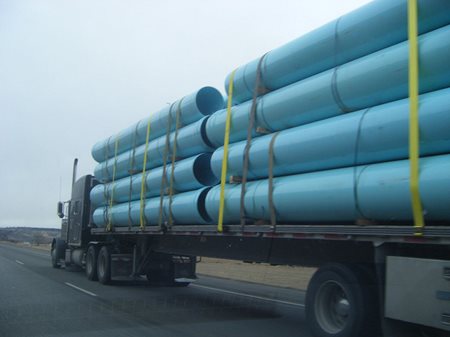The roads that serve as lifelines to the oil and gas exploration and production industry, as well as the well sites themselves, can be dangerous places for truck drivers. According to NIOSH statistics, 40% of all fatal injuries in upstream oil and gas occur in road transport incidents, and 28% of those involve heavy goods vehicles like tractor-trailer rigs. Apart from on-road collisions, the most dangerous part of a truck driver’s job involves the loading and unloading of freight, both at vendor terminals and pipe yards, and at well sites in the field.
It’s easy to see that industry-wide load securement standards could pave the way to safer job sites and roadways. Toward that end, a load securement safety training program is under development that will help create safer and more efficient workplaces for those involved with hauling pipe, tools and other freight to the field.
In a joint effort, Ryder and one of our large oil production customers are collaborating to create a new training curriculum and certification program for vocational colleges, truck driving schools, and others servicing the oil and gas industry.

Many in the industry see the need for safety standards. Some of the industry’s largest companies have their own safety protocols. Major trade associations, like the International Association of Oil and Gas Producers, the American Petroleum Institute and the International Association of Drilling Contractors have established numerous safety recommendations for such issues as hiring, training, behavior-based management and the like.
More recently, load securement has caught the interest of some of these groups along with the National Institute for Occupational Safety and Health (NIOSH) / NORA Motor Vehicle Workgroup, which works on road transport safety issues.
Also Read: Transporting Skid Steer Loaders
But the trucking environment envisioned with the new standards could not only improve safety, but could drive efficiencies into logistics networks as well. Obviously, training and securement standards will help ensure drivers know how to secure loads, thereby reducing the potential for accidents and injuries resulting from cargo shifting during transit or while being loaded or unloaded. Additionally, standardization of freight securement practices opens the way for multi-client networks where a single truck services multiple suppliers and end users. This reduces the number of vehicles on the roads, maximizing efficiency, while eliminating both cost and risk.
To be certain, some costs will be associated with industry-wide compliance. Yet, as the industry, especially exploration and production companies, embrace the initiative, and it becomes a business standard required of their suppliers and partners in safety, load securement best practices will help stabilize and even reduce costs as we see fewer losses and greater efficiency in our logistics networks.
Most importantly, though, safety begets safety. Road transport is the most visible activity of the oil and gas industry. Each failed load that leads to a road hazard, accident, or injury is a blemish on the industry. As road safety is part of our public trust, we must have zero tolerance for error.
In the end, creating road transport safety standards will create safer job sites and roadways, and become a lasting legacy of the oil and gas industry.
This article was originally featured on Ryder.com.
Image Source - https://www.flickr.com/photos/icanchangethisright/